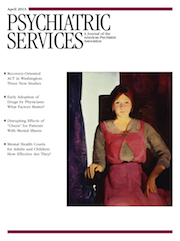A False Dilemma and an Unfair Characterization of Veterans: In Reply
In Reply: Marx and Pollack take issue with the concern I raised about ineffective mental health care provided to veterans with PTSD through the VA. Unfortunately, they set up a straw-man argument that does not address the most important aspects of my commentary and instead suggest that I unfairly stigmatize veterans. My criticism is entirely of the VA as a system, not of veterans.
Although Marx and Pollack cite several studies that purportedly contradict narrow aspects of the concerns I raised, they mischaracterize the findings of these studies. None of these studies were designed to evaluate the effectiveness or appropriateness of VA’s disability policies, address the question of whether there is a meaningful secondary gain effect, or answer the question of whether there are better service models for veterans. In contrast, Marx and Pollack sidestep the ample number of reasons for concern about the effectiveness of VA’s current treatment and disability services (1–5).
In my very brief commentary, I asked that the VA reflect on its policies and review the available evidence regarding the effectiveness of the mental health care provided to veterans. The VA could start by examining data from the PTSD symptom checklists that veterans with PTSD diagnosis are asked to complete every 90 days. These data have been collected for several years at the national level, and if aggregated, they would demonstrate a trajectory of clinical symptoms during the course of VA treatment. To the best of my knowledge, these data have not been published or disseminated.
The conversation required now concerns how to best ensure that veterans with posttraumatic conditions receive the most effective services possible in order to maximize quality of life and reintegration with society. Our entire society has a stake in this goal. Unfortunately, as far as I know there is virtually no convincing administrative data to indicate that VA is effectively treating veterans with combat-related PTSD. This is cause for concern. How can we as a society justify maintaining the status quo of a VA system that cannot show that it is helping veterans with PTSD?
1 : Did Vietnam veterans get sicker in the 1990s? The complicated effects of military service on self-reported health. Journal of Public Economics 94:824–837, 2010Crossref, Google Scholar
2
3 : US Department of Veterans Affairs disability policies for PTSD: administrative trends and implications for treatment, rehabilitation, and research. American Journal of Public Health 97:2143–2145, 2007Crossref, Medline, Google Scholar
4 : Psychiatric disorder and suicide in the military, then and now: commentary on Frueh and Smith. Journal of Anxiety Disorders 26:776–778, 2012Crossref, Medline, Google Scholar
5 : Why we should worry about malingering in the VA system: comment on Jackson et al. (2011). Journal of Traumatic Stress 25:454–456, author reply 457–460, 2012Crossref, Medline, Google Scholar



